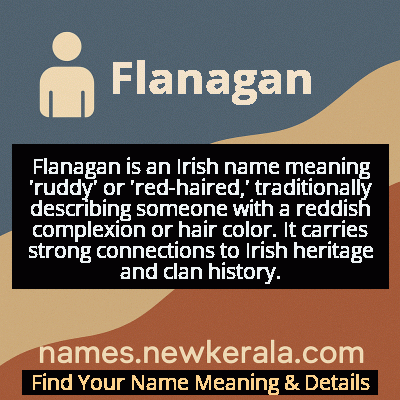Flanagan Name Meaning & Details
Origin, Popularity, Numerology Analysis & Name Meaning of Flanagan
Discover the origin, meaning, and cultural significance of the name FLANAGAN. Delve into its historical roots and explore the lasting impact it has had on communities and traditions.
Name
Flanagan
Gender
Male
Origin
Irish
Lucky Number
2
Meaning of the Name - Flanagan
Flanagan is an Irish name meaning 'ruddy' or 'red-haired,' traditionally describing someone with a reddish complexion or hair color. It carries strong connections to Irish heritage and clan history.
Flanagan - Complete Numerology Analysis
Your Numerology Number
Based on Pythagorean Numerology System
Ruling Planet
Moon
Positive Nature
Diplomatic, friendly, artistic, empathetic.
Negative Traits
Over-sensitive, moody, indecisive, prone to self-pity.
Lucky Colours
Green, cream, white.
Lucky Days
Monday.
Lucky Stones
Pearl, moonstone.
Harmony Numbers
1, 3, 4.
Best Suited Professions
Diplomats, mediators, caregivers, artists.
What People Like About You
Cooperative spirit, friendliness, artistic talent.
Famous People Named Flanagan
Fergus Flanagan
Irish chieftain
Lord of Uí Fhloinn territory in County Roscommon, progenitor of the Flanagan clan
Fionn Flanagan
Actor
Acclaimed Irish actor known for roles in 'The Others' and 'The Guard', winner of multiple Irish Film and Television Awards
Mick Flanagan
Comedian
Popular British stand-up comedian with multiple Netflix specials and television appearances
Seán Flanagan
Politician and Gaelic footballer
Former Irish Minister for Lands and two-time All-Ireland Senior Football Championship winner with Mayo
Name Variations & International Equivalents
Click on blue names to explore their detailed meanings. Gray names with will be available soon.
Cultural & Historical Significance
The name represents a direct link to Ireland's ancient Gaelic aristocracy and the survival of Irish identity through centuries of colonization and cultural suppression. During the Irish diaspora, Flanagans carried their name and heritage to new lands, particularly during the Great Famine of the 1840s. Today, the name serves as a marker of Irish identity worldwide, connecting modern bearers to a rich cultural legacy of storytelling, resilience, and community. The continued use of the name, both as surname and occasionally as given name, demonstrates the enduring power of Irish cultural memory and family tradition.
Extended Personality Analysis
Individuals bearing the Flanagan name are often perceived as possessing strong Irish characteristics including wit, resilience, and emotional depth. They tend to be known for their storytelling abilities, quick humor, and social nature, traits that align with the name's historical association with poets and historians. The 'ruddy' meaning suggests passionate, fiery personalities with strong convictions and emotional expressiveness. Flanagans are typically seen as loyal to family and community, with a deep sense of heritage and tradition that often manifests in strong family bonds and cultural pride.
Many display creative talents and intellectual curiosity, carrying forward the legacy of their ancestors who were keepers of knowledge and culture. Their resilience often manifests as an ability to overcome adversity with humor and determination, a trait honed through centuries of Irish history. Flanagans are frequently described as having strong communication skills, whether through writing, speaking, or artistic expression. They tend to be socially engaging people who value community and connection, while also maintaining the independent spirit associated with their ancestral roots. The combination of fiery passion and intellectual depth creates individuals who are both emotionally expressive and thoughtfully reflective.
Modern Usage & Popularity
In contemporary times, Flanagan remains predominantly a surname rather than a given name, though it occasionally appears as a first name honoring family heritage. The name maintains strong associations with Irish diaspora communities worldwide, particularly in the United States, United Kingdom, Canada, and Australia. While not among the most common Irish surnames, it retains cultural recognition and is often immediately identified as Irish. In recent decades, there's been a modest revival of traditional Irish names, though Flanagan as a first name remains relatively rare. The surname continues to be proudly borne by families maintaining connections to their Irish roots, with many actively researching genealogy and participating in Irish cultural organizations. Social media and online genealogical resources have helped strengthen these connections across global Flanagan families.
Symbolic & Spiritual Meanings
Symbolically, Flanagan represents the fiery spirit and passionate nature associated with the color red. The 'ruddy' meaning connects to vitality, life force, and emotional intensity, suggesting individuals who approach life with enthusiasm and conviction. It symbolizes the enduring flame of Irish culture and resistance, reflecting the historical resilience of the Irish people through famine, oppression, and diaspora. The name carries connotations of creativity and wisdom, harkening back to its association with poets and historians who preserved cultural memory through oral and written traditions. It also represents family continuity and ancestral pride, embodying the unbroken chain from ancient Gaelic chieftains to modern bearers worldwide. The fiery symbolism suggests both the warmth of community and the spark of rebellion that characterizes much of Irish history, creating a rich tapestry of meanings that continue to resonate with name bearers today.

